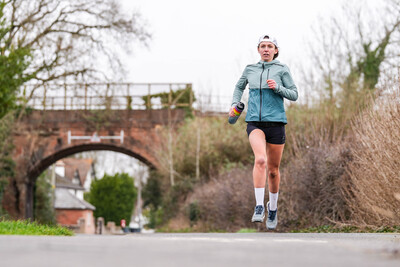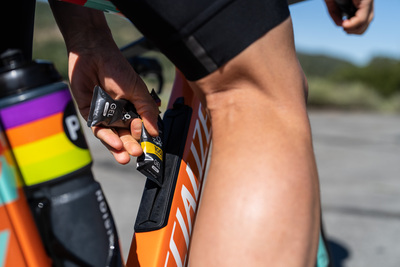Many endurance athletes can benefit from getting some caffeine on board ahead of their training sessions or races.
The well-used drug can have stimulating effects on your brain and central nervous system to help get you ready for action, but some individuals can be highly sensitive to caffeine and suffer adverse side-effects that derail them before they even get to the start line.
So, before working out how to incorporate caffeine into your pre-race fueling strategy, you should ask yourself: should I be using caffeine to enhance my performance?
Once you’ve answered that question, then you can consider how to use caffeine before and during your training and races…
When should you start using caffeine?
In 2015, a study found that ~76% of athletes in competition were consuming some form of caffeine. And that’s been backed up by the thousands of athletes we’ve worked with, the vast majority of whom include caffeine as part of their pre-race and in-race fueling strategies.
How you use caffeine before races and big training sessions will be highly personal to you and will come down to a mix of preference, race duration, previous experiences, tolerance, sensitivity and how often you use caffeine.
Should you 'caffeine-load'?
Whether you’re an experienced athlete who regularly uses caffeine, or someone who’s considering adding it to your pre-race fueling strategy for the first time, it’s worth remembering that using caffeine before races isn’t like carb-loading or sodium pre-loading.
If you try to maximise your caffeine levels by ingesting high dosages in the days leading up to a race, you risk experiencing the negative side-effects of caffeine consumption (i.e. you’ll be bouncing off the walls!) and this is likely to derail your preparation and performance.
Should you go ‘cold turkey’?
On the flip side, some athletes go ‘cold turkey’ by withdrawing from any source of caffeine in the days leading up to a race with the belief that they’ll then get a bigger boost when they resume their caffeine intake on race day.
For example, multiple time IRONMAN 70.3 winner Fenella Langridge chooses to withdraw from caffeine a few days before her races so that “it feels more like a stimulus” on race day.

Science tells us that there may be some benefits to tapering your caffeine intake, but any benefits are extremely small for most people and the withdrawal effects of going without your regular caffeine intake (e.g. headaches, fatigue and anxiety) will potentially be more detrimental to performance.
If you’re a habitual caffeine user, we’d suggest sticking to your usual routine and not going cold-turkey as pre-race nerves can be hard enough to overcome without adding further stress to your race build-up.
How to use caffeine BEFORE exercise
If you usually have a morning coffee, then enjoying a nice brew in the morning as usual may help to stimulate your central nervous system and can yield physiological benefits.
But, if your morning coffee is consumed more than 4 hours before you start exercising, you’ll need to consider pre-caffeinating again closer to the race start because caffeine has an average half life (the time it takes for the concentration consumed to decrease by half) of ~4-5 hours.
The term ‘pre-caffeinating’ involves consuming a dose of caffeine before training sessions or races so that the caffeine is in your system and you're reaping the full benefits when the gun goes off.
How to pre-caffeinate effectively
Depending on your habitual (day-to-day) caffeine usage, the pre-caffeination recommendation is to consume 3–6 mg of caffeine per kg of body weight (1.4-2.7mg/lbs) during the final 60 minutes before exercise.
This will provide enough time for the caffeine to be absorbed, stimulate your central nervous system and the production of adrenaline. This can help to increase your perceived energy levels, alertness and boost focusing abilities.
When to pre-caffeinate
The optimal timing of your pre-caffeination will be very individual to you. Caffeine metabolism within individuals is hugely variable, but studies have shown that generally 99% of caffeine will be absorbed within 45 to 60 minutes, with the ergogenic effects being felt as early as 15-20 minutes after consumption in habitual caffeine users and fast metabolisers.
Therefore, if you’re a habitual caffeine consumer and / or a fast metaboliser, you can benefit from taking a caffeine dose within the final 30 minutes before a race.
For example, IRONMAN Mallorca winner Leon Chevalier is a habitual caffeine consumer who drinks up to six mugs of coffee a day. He consumes a PF 30 Caffeine Gel in the last 30 minutes before races which Leon says, “alongside the adrenaline of the start of the race, helps to get me feeling ready”.
But if you’re a slow metaboliser, then consuming caffeine ~30-60 minutes before exercise may be a better option in order for you to enjoy the full benefits.
We strongly recommend that you experiment with using caffeine before some of your big training sessions prior to using it on race day. This will help you understand how fast you feel the effects of caffeine and how well you tolerate it.
If you’re racing for up to about 4 hours, pre-caffeinating beforehand will probably provide all of the caffeine you need to get you through the event.
For longer events (4+ hours), you may want to pre-caffeinate and consume some caffeine during.

But for events of extreme durations (i.e. >12 hours), a strategic use of caffeine in the latter stages of the race can be more effective. To find out more about when you should be caffeinating during different race durations, check out our blog which asks the question: how much caffeine should you use DURING training and races?
What should you use to pre-caffeinate?
You should lean towards the lower end of the recommended dose (i.e. 3mg/kg) if you’re intending to use caffeine during a race in order to avoid exceeding recommendations on your total caffeine intake (i.e. a 70kg athlete should aim for ~210mg).
If you’re particularly sensitive to caffeine, or feel anxious before races, then a dosage of ~1-2mg/kg may be more sensible to avoid exacerbating these negative effects.
To put this into perspective, you can find the caffeine content of various products you could use to pre-caffeinate before a race below:
| Caffeine Source | Caffeine Content (mg) | For a 60kg (132lbs) athlete: | For a 90kg (198lbs) athlete: |
|---|---|---|---|
| 1 x PF 30 Caffeine Gel | 100 | 1.7mg/kg (0.8mg/lbs) | 1.1mg/kg (0.5mg/lbs) |
| Caffeinated Energy Drink (per 500ml) | ~75 | 1.3mg/kg (0.6mg/lbs) | 0.8mg/kg (0.4mg/lbs) |
| Single Espresso (50ml) | ~63 | 1.1mg/kg (0.5mg/lbs) | 0.7 mg/kg (0.3mg/lbs) |
| Cup of English Breakfast Tea (250ml) | ~70 | 1.2mg/kg (0.5mg/lbs) | 0.8mg/kg (0.4mg/lbs) |
| Coke (330ml can) | 34 | 0.6mg/kg (0.3mg/lbs) | 0.4mg/kg (0.2mg/lbs) |
If you're partial to a morning brew, it's worth checking how much caffeine is in your brand of coffee.
For those of you who don’t tolerate or enjoy the taste of caffeine, focus on nailing other good pre-race practices such as carb-loading, sodium preloading and getting quality sleep in the build-up to your race.
Ultimately, whilst carb-loading to top up your fuel stores and preloading with sodium to start optimally hydrated are viewed as universally important ways to help ensure you’re starting a race well fueled and hydrated, caffeine should be viewed as an additional performance aid rather than a necessity.
Key takeaways
- Before adding caffeine to your pre-exercise fueling strategy, answer the question: should I be using caffeine to enhance my performance?
- The recommended pre-caffeine dose is 3-6mg of caffeine per kg of bodyweight ~0-60 minutes before exercising
- If you intend to use caffeine during exercise too, you should consume the lower 3mg/kg dose pre-race
- Trial your pre-race caffeine intake before big training sessions because your needs will be based on personal preference, race duration, previous experiences, tolerance, sensitivity and how often you use caffeine
- Once you’ve worked out your optimal pre-exercise intake, then you can consider how to use caffeine DURING exercise
